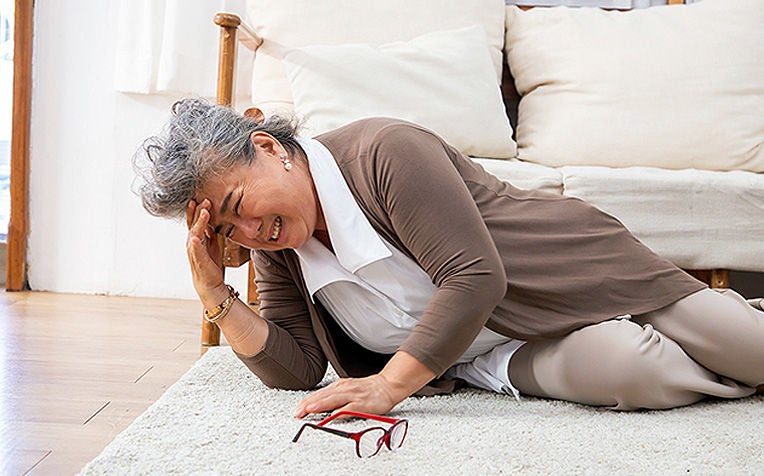
Head injuries for the elderly are common as they are prone to falls.
What is a traumatic brain injury (TBI)?
"Traumatic brain injury (TBI), commonly known as a head injury, affects both the young and the elderly. In young adults, it usually involves a road traffic accident or a fall from height. Head injuries are also a leading cause of death and disability for this group," shared Dr Lim Jia Xu, Associate Consultant from the Department of Neurosurgery at National Neuroscience Institute (NNI), a member of the SingHealth group.
"For seniors, falls are the main cause of head injuries," he added.
Mild head injury vs moderate and severe head injuries
Mild TBI: Can cause headaches, nausea, giddiness, poor focus, and irritability. This is sometimes known as post-concussion syndrome, and it usually lasts a few days. In rare cases, it may persist between six and 12 months — these require specialist review.
-visuals/mild-tbi-symptoms-visual.jpg)
Moderate or severe TBI: Needs close monitoring in a Neuroscience Intensive Care or High Dependency Unit so that any deterioration can be detected early. Brain surgery may be needed. Despite advances in care, death rates remain significant, especially among the elderly. Survivors often require months of rehabilitation to give them the best chance of recovery.
What to do after a head injury
1. Go to the nearest Emergency Department (ED) if the person is at high risk of brain injury
-visuals/ED-symptoms-visual.jpg)
Example of a high-risk person is the elderly (aged 65 and above)
Another example of a high-risk individual is a person taking blood thinner medication; e.g. aspirin, clopidogrel, warfarin, rivaroxaban
Go to the ED if the injury is caused by a road traffic accident, fall from height, or assault
Go to the ED if the injured person shows signs of serious brain injury such as:
Drowsiness, recurrent vomiting episodes
Numbness or weakness in the limbs, or difficulty walking or talking
Change in behaviour
Open wounds that are bleeding
Blood or fluid coming out of the nose or ears
2. At the Emergency Department (ED), inform the doctor / nurse
-visuals/tell-doctor-nurse-symptoms-visual.jpg)
How the injury happened and what time it took place
If the injured person displays the following signs:
Headache with nausea or vomiting
Memory loss
Loss of consciousness and the duration of the episode
Signs of a seizure; e.g. uprolling of eyes, or jerking of the arms and legs
Any medical conditions or recent operations
3. When discharged from the Emergency Department (ED)
-visuals/discharged-from-ED-visual.jpg)
For 24 hours after the injury:
Do not let the injured person be left alone, drink alcohol, or take medications that can cause sleepiness
Monitor the person regularly for signs of brain injury as mentioned above
For the next days to weeks:
Continue to watch out and check for subtle changes in alertness and behaviour, or any new weakness / difficulty walking; if seen, bring the person to the nearest ED
Why are seniors at higher risk of head injuries and complications? Click here to find out.
Ref: K21
Other articles you may be interested in:
Headache or Migraine? How to Tell the Difference
Primary vs Secondary Headaches
Contributed by













